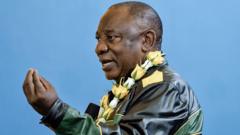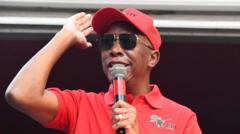As President Cyril Ramaphosa prepares for his first meeting with Donald Trump, his prowess as a negotiator will be crucial in mending diplomatic ties strained by recent tensions and controversial policies.
Can South Africa's Cyril Ramaphosa Bridge Diplomatic Gaps With Trump?

Can South Africa's Cyril Ramaphosa Bridge Diplomatic Gaps With Trump?
Cyril Ramaphosa's upcoming meeting with Donald Trump at the White House poses significant challenges as South Africa seeks to repair strained US relations.
South African President Cyril Ramaphosa stands at a crucial crossroads as he embarks on his first meeting with US President Donald Trump at the White House. Known for his role as the chief negotiator during the transition from apartheid, Ramaphosa's keen diplomatic skills will be indispensable as he aims to mend the fractured relations between South Africa and the United States.
The upcoming encounter takes place against a backdrop of discord. The Trump administration has expressed vocal criticism over South Africa's internal policies, particularly recent legislation allowing land expropriation without compensation, which exacerbated the already strained relationship. Trump controversially asserted that South African Afrikaners were suffering from a "genocide," a claim that has been widely disputed and criticized.
In an effort to recalibrate the relationship, Ramaphosa emphasized trade, aiming for a "good trade deal" that would enhance bilateral cooperation. His visit comes following months of heightened tensions, including the suspension of US aid and the expulsion of South Africa's ambassador following a diplomatic spat over claims of racism.
Analysts anticipate that the meeting will swing either positively or negatively, hinging on the ability of Ramaphosa and his team to present a compelling case for South Africa's sovereign right to make its own policy decisions. Ramaphosa's adeptness at negotiation won’t just be tested in discussions; it will also play a role in softening the atmosphere surrounding the meeting.
Despite the challenges, Ramaphosa is bringing along professional golfers as part of his delegation, with hopes that shared interests might create a more congenial mood. A long-time advocate for democratic principles and reconciliation, he is expected to confront skewed perceptions and push for a normalization of US-South Africa relations.
The South African delegation, which features key cabinet ministers, aims to discuss extending the African Growth and Opportunity Act (AGOA), which allows duty-free access to US markets for certain African goods. There are concerns that South Africa might not have its trade benefits renewed, making discussions more imperative.
Additionally, diplomatic hurdles persist due to a contentious case brought by South Africa against Israel at the International Court of Justice, which could complicate discussions. Ramaphosa's spokesperson revealed that the goal of the trip is to initiate a constructive dialogue that could pave the way for improving trade relations amid concerns of mutual dependency.
In light of the economic interdependence, South Africa is prepared for a nuanced exchange, pitching a case for their essential exports that range from minerals to agricultural products. Political analysts remain cautiously optimistic that this meeting could mark the beginning of a new phase in US-South Africa relations, regardless of the immediate outcome.
The future of their interactions relies as much on diplomatic maneuvering as on addressing the broader geopolitical landscape surrounding both nations. As Ramaphosa heads to Washington, the stakes are high—but so is the potential for redefining a crucial bilateral relationship.





















